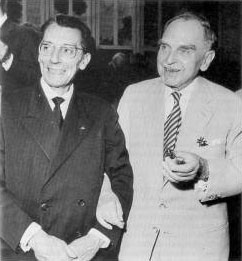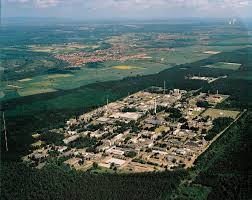The 2017 Frédéric Joliot / Otto Hahn Summer School on Nuclear Reactors "Physics, Fuels and Systems"
 |
| Frédéric Joliot and Otto Hahn |
Karlsruhe, Germany
August 23 – September 1, 2017
Uncertainties in nuclear reactor systems analysis:
Improving understanding, confidence and quantification

|
 |
 |
Jointly organized by
the Nuclear Energy Division of the Commissariat à l’Energie Atomique (CEA/DEN), France,
and the Karlsruhe Institute of Technology (KIT/INR), Germany
 |
 |
Profile
The Frédéric Joliot / Otto Hahn Summer School pursues two objectives: On the one hand it addresses the needs and challenges of nuclear systems -- Reactor and fuel design and operation, evolutionary and innovative concepts, optimal solutions for the back-end of the fuel cycle, etc. On the other hand, the School aims at keeping scientists and engineers abreast of the latest developments in basic and applied nuclear sciences, so as to preserve the high standard of knowledge in reactor physics and reactor technology.
This international course is intended for junior as well as experienced scientists and engineers in R&D laboratories, nuclear industry and utilities. Postdocs are also encouraged to apply.
Lecturers are invited from internationally leading universities and industry. The School format encourages informal discussions and the exchange of knowledge between lecturers and participants.
The Frédéric Joliot / Otto Hahn Summer School is a continuation of the Frédéric Joliot Summer School founded by the Commissariat à l´Énergie Atomique in 1995 to promote knowledge in the field of reactor physics in Cadarache, France.
The Frédéric Joliot / Otto Hahn Summer School is jointly organized by the Nuclear Energy Division of the Commissariat à l´Énergie Atomique (CEA/DEN, France) and the Karlsruhe Institute of Technology (Germany).
Description
The 23rd session of the Frédéric Joliot/Otto Hahn (FJOH) Summer School on “Nuclear Reactors Physics, Fuels, and Systems” will be held in Karlsruhe, Germany, from August 23 to September 1, 2017. This session is entitled Uncertainties in nuclear reactor systems analysis: Improving understanding, confidence and quantification. It is an advanced course aimed at junior as well as experienced scientists and engineers engaged in the broad field of nuclear sciences, engineering and technologies.
The FJOH-2017 objective is to help the school participants broaden their knowledge of uncertainty assessment for the design, operation and safety of complex technological systems such as nuclear reactors. The overall course will describe methods for estimating and propagating statistical and systematic errors, VVUQ methodologies and best practices, the main challenges and limitations, expected improvements and current R&D trends.
The FJOH-2017 programme covers the following three topics: (1) Methods of uncertainty assessment and their propagation; (2) Error analysis in reactor core/fuel design and operation; (3) Uncertainty quantification methods in safety analyses. In the 1st topic, common and advanced concepts of statistical error analysis will be described, as well as the general methodological basis for VVUQ. In the 2nd topic, these concepts and methods will be specialized to nuclear data, reactor core physics, thermal-hydraulic and fuel modelling as well as plant data analyses. In the 3rd topic, practical methods of uncertainty and margin estimations will be described in the integrated approach to allow for a plant safety demonstration. Examples will be provided throughout the course to illustrate actual practices.
FJOH-2017 includes plenary lectures, group discussions, seminars, and technical visits. The speakers invited are internationally recognized experts from leading universities, research and development laboratories and industry.
The FJOH-2017 participants will have the opportunity to share their views on specific cross-cutting subjects and open-ended questions, as part of group reflection and critical thinking activities. Time for these group activities is reserved in the School schedule.
This course represents the continuation of the Frédéric Joliot Summer Schools on «Modern Reactor Physics and the Modelling of Complex Systems», which was created by CEA in 1995 to promote knowledge in the field of reactor physics, in a broad sense, and the international exchange of teachers, scientists, engineers and researchers. Beginning in 2004, the scope of the School was extended to include scientific issues related to nuclear fuels. The venues of the FJOH School sessions alternate between Karlsruhe and Aix-en-Provence.
The School’s aim is to address the challenges of reactor design and optimal fuel cycles, and to broaden the understanding of theory and experiments.
The programme of each School session is defined by the International FJOH Scientific Board.
The Karlsruhe Institute of Technology and the Nuclear Energy Division of CEA jointly organize and sponsor the FJOH Summer School.
Programme Outline
1. Introduction 2 h
1.1. On the practical importance of uncertainties for nuclear applications
1.2. Overview of current approaches, practices, and trends in the nuclear industry
R. Taylor (Manchester Univ. & NNL)
2. Methods of uncertainty assessment and propagation 12 h
2.1. Statistical uncertainty, error propagation, correlation analysis, statistical
testing, linear regression, estimation techniques (3 h) H. Abdel-Khalik (Purdue Univ.)
2.2 Uncertainty quantification using global sensitivity
analysis methods (3 h) B. Iooss (EdF)
2.3 Epistemic uncertainty propagation in risk/reliability
analyses (2 h) S. Destercke (Compiègne TU/CNRS)
2.4 VVUQ of modelling & simulation tools: Basic principles and
methodology (2 h) W. Oberkampf (Consulting Engineer)2.5 Planning and designing representative and optimized (envelope) validation experiments (2 h) W. Oberkampf (Consulting Engineer)
3. Error analysis in reactor core and fuel design and operation 10 h
3.1 Nuclear data covariance assessment and data assimilation (2h) H. Leeb (TU Wien)
3.2
Uncertainty
evaluation, sensitivity analysis, error propagation
and V&V experiments for core physics (2h) T. Kozlowski (Univ. Illinois)
3.3
New methods for assessing uncertainties in CFD
simulations,
inferring limitations (2h) R. Macian-Juan (TU
Munich)
3.4 Uncertainties in fuel modelling (2h) A. Bouloré (CEA)
3.5 Deriving information from large sets of measurements (2h) R. van Geemert (AREVA)
4. Uncertainty quantification methods in safety analyses 10 h
4.1 Deterministic and statistical methods of uncertainty and
sensitivity evaluation (2h) H. Gläser (GRS)
4.2 Safety margin assessment and decision process (2h) E. Ivanov (IRSN)
4.3 Evaluating uncertainties and correlations in fuel thermo-mechanics
and system thermo-hydraulics calculations (2h) F. Gaudier (CEA)
4.4 CIAU methodology for uncertainty evaluation in
thermal-hydraulics (2h) A. Petruzzi (NINE Consulting)
4.5 Uncertainty quantification for severe accident scenarios (2h) X. Zheng (JAEA)
Group Reflection on Selected Scientific Topics 6 h
Seminar 2 h
Real-time On-line Decision Support Systems for Off-site
Emergency Management W. Raskob (KIT)
Technical visits of Karlsruhe Institute of Technology R&D facilities
Download
| Content | File | Format | Size |
| First Announcement | Pre-Announcement.pdf | 104 KB | |
| Leaflet | FJOH-2017_Leaflet | 1128 KB | |
| Poster | FJOH-2017_Poster | 1031 KB |
